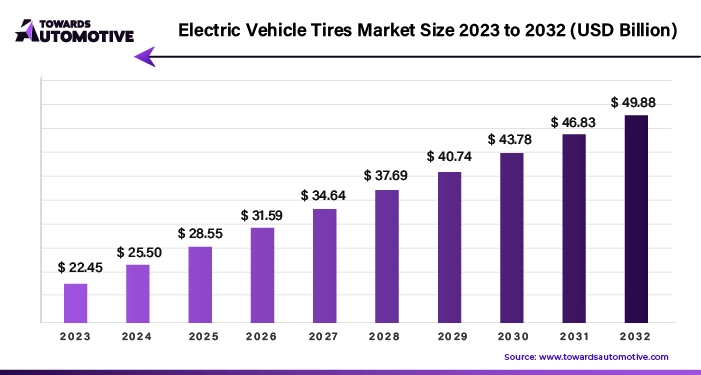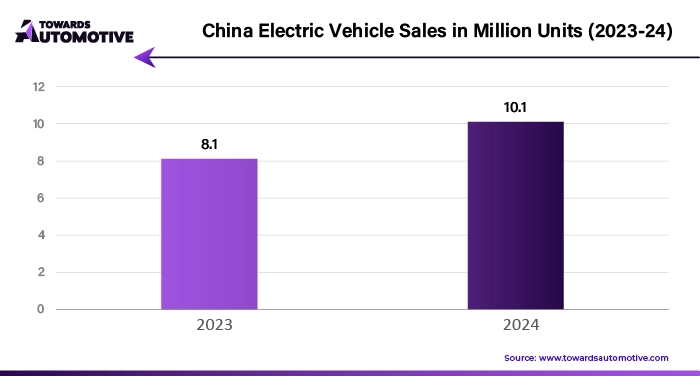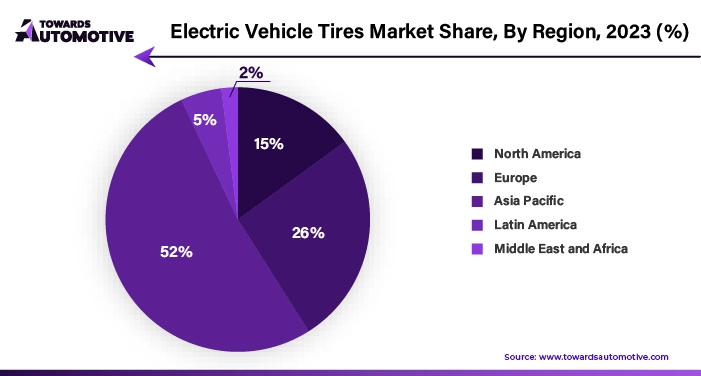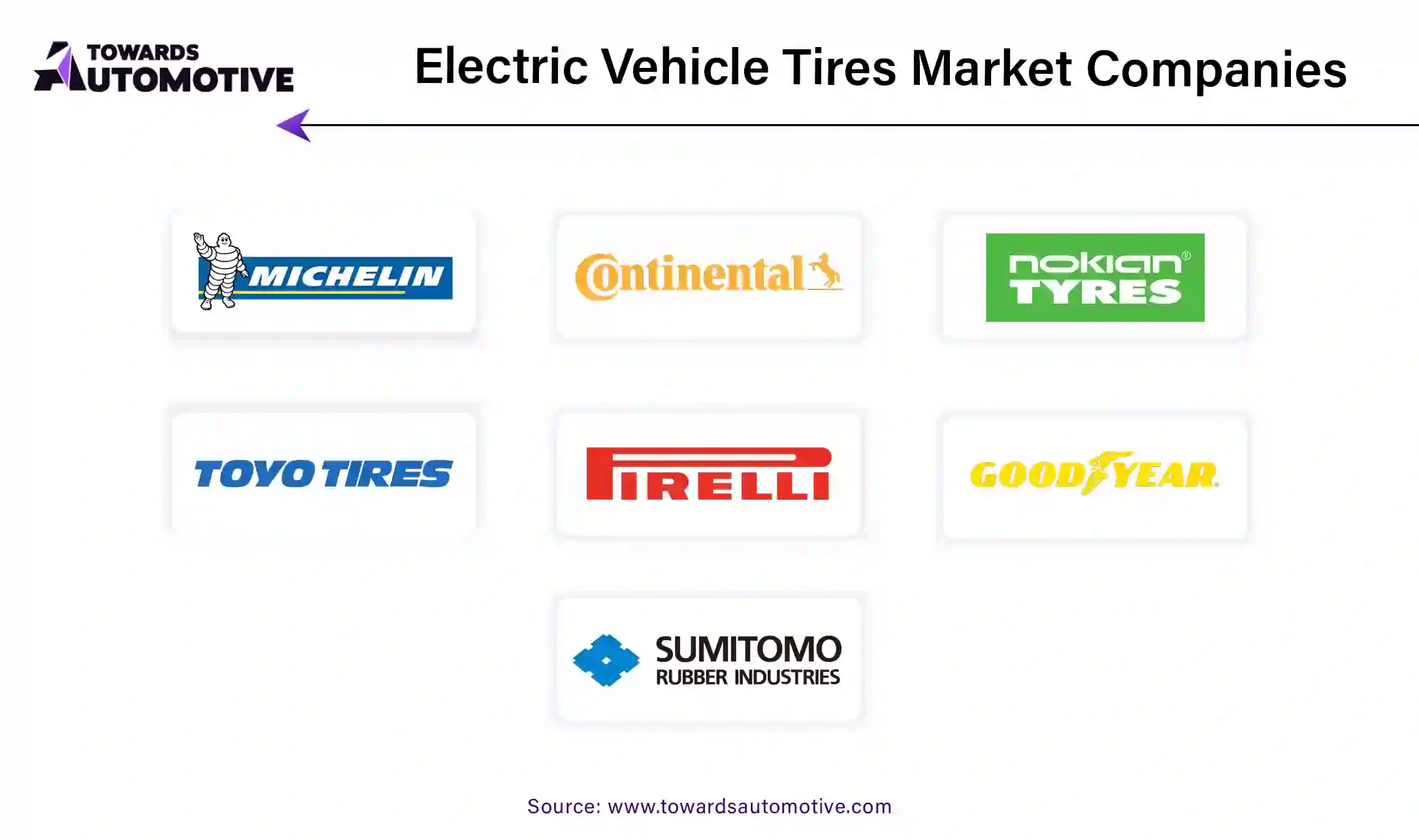October 2025
The global electric vehicle tires market is forecasted to expand from USD 26.81 billion in 2025 to USD 59.59 billion by 2034, growing at a CAGR of 9.28% from 2025 to 2034.

The electric vehicle tires market is a rapidly expanding segment within the automotive industry, driven by the growing adoption of electric vehicles worldwide. EV tires are specifically designed to meet the unique demands of electric vehicles, such as higher torque, heavier weight due to battery packs, and the need for improved energy efficiency to maximize range. These specialized tires play a crucial role in enhancing the overall performance, safety, and longevity of electric vehicles, making them an essential component in the EV ecosystem.
The market is witnessing significant growth due to advancements in tire technology, including innovations in materials, tread design, and manufacturing processes tailored to the requirements of EVs. Additionally, the increasing focus on sustainability has led to the development of eco-friendly tires made from renewable and recyclable materials, aligning with the green ethos of electric vehicles.
Factors such as rising EV sales, government incentives for electric mobility, and the global push toward carbon neutrality are fueling demand for EV-specific tires. Leading tire manufacturers are investing heavily in research and development to create tires that offer low rolling resistance, improved grip, and durability, catering to both passenger and commercial electric vehicles. As EV adoption continues to surge, the electric vehicle tires market is poised for substantial growth in the coming years.
| Rank | Supplier (EV Tire Leader) | 2024 Profitability % | Metric Used |
| 1 | Hankook Tire & Technology | 18.70% | Operating Margin (EBIT) |
| 2 | Pirelli | 15.70% | Adjusted EBIT Margin |
| 3 | Continental – Tires Segment | 13.70% | Adjusted EBIT Margin |
| 4 | Michelin | 12.60% | Segment Operating Margin |
| 5 | Bridgestone | 10.90% | Adjusted Operating Margin |
Artificial intelligence (AI) plays a transformative role in the electric vehicle tires market, enhancing innovation, efficiency, and customization in tire design, manufacturing, and performance monitoring. AI-driven algorithms are widely used in tire development to analyze complex data related to EV-specific requirements such as weight distribution, torque impact, and energy efficiency. This enables manufacturers to design tires with optimized rolling resistance, improved durability, and enhanced grip, directly addressing the unique demands of EVs.
In manufacturing, AI-powered systems streamline production processes by utilizing predictive analytics and real-time monitoring. These technologies help minimize defects, reduce material waste, and improve overall production efficiency. Moreover, AI facilitates the use of advanced simulations to test tire performance under various conditions, accelerating time-to-market for new products.
AI also plays a critical role in smart tire technology. Embedded sensors in EV tires, combined with AI algorithms, enable real-time monitoring of tire pressure, temperature, and tread wear. This data is shared with vehicle systems to improve safety, energy efficiency, and predictive maintenance, reducing downtime and costs for EV owners.
Additionally, AI enhances customer experiences by offering personalized tire recommendations based on driving habits and vehicle specifications, ensuring better compatibility and performance. By driving technological advancements, AI is a key enabler of growth and innovation in the EV tires market.
The growing sales of electric vehicles (EVs) are a key driver for the expansion of the electric vehicle tires market. As the adoption of EVs accelerates globally, there is a rising demand for tires specifically designed to meet the unique requirements of electric mobility. Unlike conventional vehicles, EVs are typically heavier due to larger battery packs, which places additional stress on tires. This has led to the development of specialized tires that can handle the increased weight while also providing optimal performance in terms of grip, efficiency, and durability.
The growth in EV sales directly translates to a higher need for tires with low rolling resistance, which improve energy efficiency and extend the driving range of EVs. As consumers and manufacturers focus more on maximizing the driving range, tires that reduce energy loss become an essential component of EV design. Moreover, the heavy torque produced by EVs demands tires that offer better traction and handling, making specialized tire solutions more critical.
Furthermore, government incentives and stricter emission regulations are driving the shift toward EV adoption, boosting tire manufacturers’ investments in developing and improving EV-specific tire technologies. With major automakers increasing their EV production targets, tire manufacturers are ramping up their efforts to cater to this growing market. This shift creates a significant opportunity for the electric vehicle tire market to grow, as the demand for specialized, efficient, and high-performance tires continues to rise alongside increasing EV sales.

The electric vehicle tires market faces several restraints that can hinder its growth. One key challenge is the higher cost of specialized EV tires, which are designed to handle the increased weight and torque of electric vehicles, leading to a premium price compared to conventional tires. Additionally, limited availability of EV-specific tire options in certain regions may hinder adoption. Technological complexity involved in developing tires with low rolling resistance, enhanced durability, and energy efficiency can also increase manufacturing costs and slow down innovation. Moreover, supply chain disruptions and raw material shortages pose challenges for consistent production.
Advancements in self-inflating tire technology are creating substantial opportunities in the electric vehicle tires market, addressing key challenges associated with EV performance, safety, and efficiency. Self-inflating tires, equipped with advanced pressure management systems, automatically adjust air pressure to the optimal level, enhancing tire durability, energy efficiency, and overall vehicle performance. For EVs, where efficiency is critical to maximize battery range, these tires help reduce rolling resistance by maintaining consistent pressure, thus conserving energy and extending driving range.
The integration of self-inflating technology also addresses safety concerns, as underinflated tires are a common cause of accidents and uneven tire wear. By ensuring consistent tire pressure, these advanced tires improve traction, handling, and braking performance, which are particularly important for the heavier loads and higher torque output of EVs. This technology aligns with the increasing consumer demand for low-maintenance, high-performance solutions tailored for EVs.
Moreover, self-inflating tires contribute to sustainability by extending tire lifespan and reducing the frequency of replacements, aligning with the eco-friendly ethos of electric mobility. Tire manufacturers are leveraging materials like smart sensors and advanced polymers in self-inflating systems, combining durability with cutting-edge functionality. This innovation is gaining traction as automakers prioritize integrating smart technologies into EV designs.
With growing investments in tire innovation and rising EV adoption, self-inflating tire advancements represent a transformative opportunity. They cater to consumer preferences for convenience, sustainability, and efficiency which is expected to create opportunities in the upcoming years to come.
The battery electric vehicle (BEV) segment led the industry. Battery Electric Vehicles (BEVs) are a significant driver of growth in the electric vehicle tires market due to their increasing adoption and specific performance requirements. Unlike internal combustion engine (ICE) vehicles, BEVs rely entirely on battery power for propulsion, which makes efficiency, durability, and low rolling resistance critical factors for tire design. As the global shift toward cleaner transportation accelerates, BEVs are becoming the most widely adopted type of EV, propelling demand for specialized tires engineered to meet their unique needs.
BEVs typically have heavier batteries, which add significant weight compared to traditional vehicles. This requires tires with enhanced load-bearing capacity and durability. Additionally, the high torque output of BEVs places added stress on tires, necessitating designs that ensure optimal grip and wear resistance. Tire manufacturers are addressing these needs with innovations such as reinforced sidewalls, advanced rubber compounds, and optimized tread patterns tailored for BEV performance.
Moreover, the rising BEV adoption worldwide, driven by government incentives, stricter emissions regulations, and declining battery costs, is directly impacting the tire market. As BEVs gain popularity among consumers and fleet operators, the demand for tires that enhance range efficiency through low rolling resistance is increasing. Leading automakers such as Tesla, BYD, and Volkswagen are pushing BEV production, creating opportunities for tire manufacturers to supply high-performance tires.
The passenger car segment dominated the market. With increasing consumer demand for electric passenger vehicles, driven by rising environmental concerns, government subsidies, and advancements in EV technology, the need for specialized tires tailored to this vehicle class has grown substantially. Passenger EVs such as sedans, hatchbacks, and compact SUVs, have unique performance requirements that necessitate innovative tire designs to optimize efficiency, comfort, and safety.
Passenger EVs are typically equipped with heavier batteries compared to internal combustion engine (ICE) vehicles, leading to higher demands on tires in terms of load capacity and durability. This has driven tire manufacturers to develop EV-specific tires with features such as reinforced structures, advanced rubber compounds, and improved tread designs to handle the additional weight while maintaining performance. Furthermore, the quiet operation of EVs has heightened the need for low-noise tire technology, ensuring a smoother and quieter driving experience for passengers.
The rising popularity of EV passenger cars, fueled by models like the Tesla Model 3, Hyundai Ioniq 5, and BYD Dolphin, is expanding the demand for these specialized tires. Additionally, as automakers focus on improving EV range, low rolling resistance tires for passenger cars are increasingly in demand to enhance energy efficiency.

Asia Pacific dominated the electric vehicle tires market. The electric vehicle tires market in Asia-Pacific (APAC) is experiencing robust growth, driven by the rapid expansion of the EV market, substantial investment in EV infrastructure, and supportive government policies and incentives. The APAC region, home to leading EV manufacturers like BYD, Tata Motors, and Hyundai, has seen a significant rise in EV production and adoption, particularly in countries such as China, Japan, and India. This surge in EV usage is creating a high demand for specialized tires tailored to meet the unique requirements of EVs, such as improved durability, low rolling resistance, and noise reduction.
Investment in EV infrastructure plays a pivotal role in supporting market growth. Countries across APAC are heavily investing in expanding their EV charging network, enhancing consumer confidence and encouraging EV adoption. For example, China and South Korea are setting up extensive charging stations and battery-swapping networks, facilitating the widespread use of EVs, which subsequently increases the demand for EV-specific tires.
Furthermore, government policies and incentives have been instrumental in driving market growth. Subsidies for EV purchases, tax rebates, and stringent emission norms aimed at reducing pollution have prompted consumers and automakers to transition to electric mobility. For instance, India’s FAME (Faster Adoption and Manufacturing of Hybrid and Electric Vehicles) program and China's NEV (New Energy Vehicle) policies are accelerating EV penetration in the market. Thus, the above-mentioned factors are propelling the growth of the electric vehicle tires market.
Europe is expected to grow with a significant CAGR during the forecast period. The electric vehicle tires market in Europe is witnessing significant growth, propelled by high EV adoption rates, stringent emission regulations, and the rapid expansion of charging infrastructure. Europe has emerged as a global leader in EV adoption, with countries like Norway, Germany, and the Netherlands recording substantial increases in EV sales. This surge is driving demand for specialized EV tires designed to enhance performance, reduce energy consumption, and ensure durability under the unique conditions of electric vehicles, such as higher torque and heavier weight.
Stringent emission regulations enforced by the European Union, such as the EU’s CO2 standards for cars and vans, have accelerated the transition to electric mobility. Governments are pushing for a greener automotive sector, offering incentives for EV manufacturers and buyers, while simultaneously penalizing non-compliance with emissions standards. These regulations are prompting automakers to ramp up EV production, which in turn boosts demand for EV-specific tires that meet efficiency and performance requirements.
In addition, the expanding charging infrastructure across Europe is further fueling EV adoption, making electric vehicles a viable option for a broader consumer base. Countries like France and the UK are heavily investing in public charging stations, supported by EU funding programs. This infrastructure growth increases consumer confidence in EVs, further driving their adoption and creating a burgeoning market for EV tires.

By Propulsion Type
By Sales Channel
By Tire Size
By Vehicle Type
By Region
October 2025
October 2025
October 2025
October 2025
We offer automotive expertise for market projections and customizable research, adaptable to diverse strategic approaches.
Contact Us